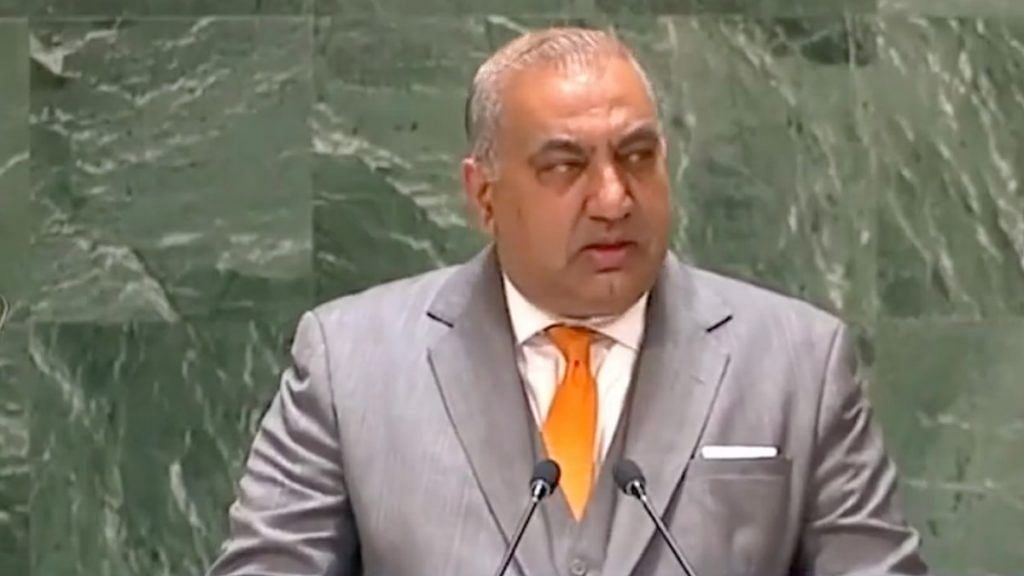New Delhi: Karambir Singh Kang lost his wife and two young children in the 2008 Mumbai terror attacks. A former general manager of the Taj Hotel in Mumbai, he was there when the Taj Hotel came under attack on 26 November 2008.
“People who planned, financed, and organised the attack remain free. While our company and staff received global accolades for their heroic deeds, we have spent 14 long and painful years trying to seek justice,” Kang said Thursday.
Kang was addressing the 1st United Nations Global Congress of Victims of Terrorism in New York, United States. The conference, aimed at providing a platform for victims of terrorism to share their experiences, challenges, and stories of resilience and to “advocate for the strengthening and upholding of their rights and effective fulfilment of their needs”, was held on 8 and 9 September.
The event saw both online and in-person participation by several people, including “survivors, diplomats, experts, and representatives from civil society, academia, and the private sector”.
According to the United Nations, the programme consisted of six “overarching themes” reflecting the rights and needs ascribed to victims of terrorism.
Kang, who has been awarded ‘Uttam Jeevan Raksha Padak’ award for bravery and ‘The Mother Teresa International Award’ in 2016, said that as an act of “defiance”, the hotel reopened barely 21 days after it was “destroyed”.
Thirty-four lives were lost on the day of the attack — including those of his “brave colleagues who were armed only with courage” and who saved over “1,000 lives” — Kang told the gathering.
“Today I call upon the international community to work together to seek justice nationally and across borders,” Kang, who’s now Area Director–USA for Indian Hotels Company Ltd, said, adding: “States must join us in defiance and ensure that there is no safe harbour for terrorists so that their heinous crimes are not given space to take root”.
In her keynote address, UN Deputy Secretary-General Amina Mohammed also underlined the need to stand with victims and survivors. She said: “Solidarity and support for victims of terrorism is a moral obligation and a humanitarian and human rights imperative”.
Also Read: Zawahiri kill raises question — If assassination ends terrorism, why can’t others follow US?
Right to Privacy or Right to Information
Among those who spoke at the event was Nidhi Chaphekar, a survivor of the 2016 attack in Brussels, Belgium. The Islamic State claimed the attack.
Chaphekar, then a cabin manager of a Jet Airways flight from Brussels to Newark, sustained more than “20 per cent burns, multiple fractures, crushed bones, ruptured eardrums, body pierced with metal shrapnels, and much more”.
She underwent over 20 surgeries after the attack.
“It is of the utmost importance to bring out the news to the public of terrorist attacks, including the sufferings, but we need to underline that the right to privacy comes before the right to information in any social or democratic society. And the media needs to look into it,” Chaphekar said in a session called ‘Breakout sessions: Protecting the Right to privacy of Victims of Terrorism’.
The session came under the broader theme of ‘Protecting the Rights of Victims of Terrorism’.
Visibly emotional, Chaphekar recounted the aftermath of the attack — the constantly ringing doorbell, the incessant phone calls, and the photos that were clicked without permission.
“There should be some time limit given to the family by the interviewers after the attack,” she said, as she recounted how privacy — not only hers but also her family’s — was constantly violated in the aftermath of the attack.
Chaphekar called for a check on graphic images posted online after such attacks because they “promote the goal towards the terrorism”.
If a child’s image becomes viral, his “right to grow”, “right to erase memory” and “right to forgive” are lost, she told the gathering.
(Edited by Uttara Ramaswamy)
Also Read: How Punjab’s most-wanted yesteryear terrorists are operating openly in Lahore, popping up on FB
